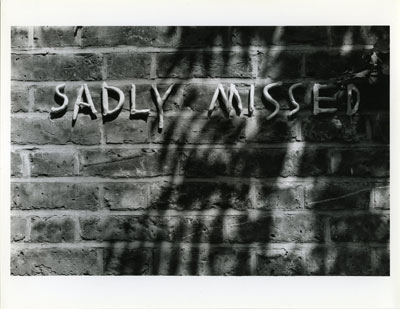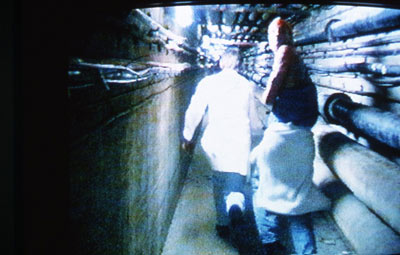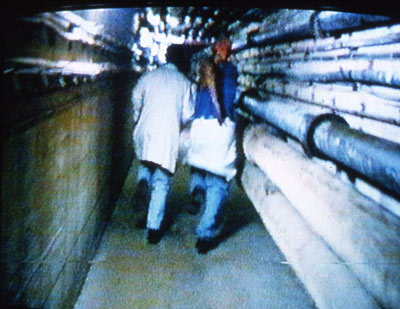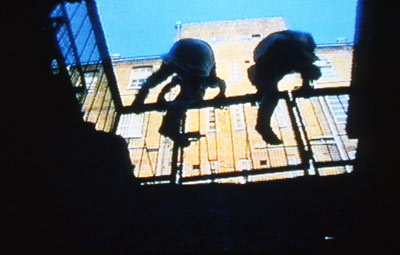Care and Control
Extracts of interviews with Hospital users, staff and others by Jo Stanley
Rear Window Publications
1995 ISBN 0 9521040 3 2
© Rear Window and Authors
Hackney Hospital was a Workhouse and is now a repository for Special Services: Geriatric, Psycho-Geriatric, Psychiatric, and Drug Dependency. However, from the mid 1930s to the late 1980s, it was, at around, 800 beds, one of the largest General Hospital in London.
A psychiatric Unit with 40 beds was opened in F Block in 1967, a small part of a bustling whole. But, when in 1986, the General Hospital began its move to the new two-storey Homerton, the crumbling Hackney was left to Psychiatric Services. By the end of this year (1995), with the new psychiatric unit at the Homerton prepared, the hospital will finally be closed.
We first approached a small number of hospital users and workers, who had a long experience of the site, to be recorded in interview. Later, we invited a wide variety of users and others who knew the site well (24 in all) to do the same. Fragments of these interviews, unmediated by analysis or explanation, offer no formal history or anthropology. We wanted simply to present the voices of those who have used this place. The resulting record is a frank reaction to the blurring intensity of the hospital. The complexities and ambivalences of hospital experience are borne out passionately in the clutter of these words.
The Building: From Workhouse to Hospital to New Site
First of all, I am 85 and I was born in 1909. With a family of five brothers and two sisters. At that time, it was hard to live because there was hardly any money knocking about. It was very hard and I remember my father used to take me round to certain places where the pensioners used to have a cup of milk or water and a hunk of bread. That was for their lunch. That was what they called the Poor Law Relief. And that was happening in Hackney Hospital as well for a while.
And did you ever come and visit the Workhouse with him?
No, it was too upsetting. I didn’t want to see it. Oh I knew there was a lot of people in here. Especially the very poor people, you know. (Joseph)
***
When you went into the Workhouse, you didn’t get out. You died there, you stayed there. The people, even the mothers knew you went into the Workhouse. So they heard it from the horse’s mouth. It is not just a piece of history for them. Hackney was the Workhouse. (Ruth)
***
What did it mean to you as a little girl of 8, when your mum said it had been built as a Workhouse?
Well, I don’t know, but it sounded it was a punishment for people, you know.
So did you have the idea when you where a little girl that your dad was in here partly as a punishment, or did you know a bit then?
I knew a bit then because the doctor came home to see him while he was in bed at home. And then they ordered him to hospital.
And so you did know it wasn’t a prison that your Dad was being sent to?
Well, the doctors in them days, they were strict. (Daisy)
***
You talk to some of the old mums that had their children here. They don’t want to know about all these modern hospitals. If this was still a general hospital, I think they would prefer to come back here because they have got an affinity with this hospital, do you know what I mean? It is people that don’t know or who have never known the hospital that kick it to death.
How do you feel about the new place?
Well, you have got to progress. But that new place won’t be standing in 100 year’s time. That will have long fallen down, I would say. (Barry)
***
Sounds, Smells
So I was asking you before about the sounds and smells that you might remember from the hospital.
Beautiful.
Would you say something about that?
Yes, they used to clean all the places out with carbolic. All you smelt all the time was carbolic. When you came out of the hospital, it sticks. (Laugh) It was so clean, I think so anyway.
Are they any other smells that you remember from it?
There is no smells now. (Tilly)
***
The smells would be stuffy smells, slightly gassy dirty carpet smells. Stale urine in the stairways.
The sound I now associate with the hospital is Boom Boom and that is the sound of the enormous great metal ball knocking down the buildings outside of my ward round. We had to go through ward rounds for months and months with the whole building shaking to the sounds of Boom Boom. (Trevor)
***
What was the boiler room like when you were first here?
It was sort of not fully automatic, the boiler house was mad. Our stokers worked in a three shift system. All Asian chaps, good blokes who knew their job. It was oldey worldey boiler house with reciprocating pumps like steam engines. They would squeak in the middle of the night and frighten the life out of anyone. If you go down there on your own, you know.
Can you imitate that squeak for us?
Not with my bad chest. Squeak! (He imitates.) I don’t know if you can visualise a double action steam pump going up and down. The packaging gets a bit tight and you are supposed to oil the steam side and if you forget to oil it, it does a sort of piercing screaming squeak. Horrible. (Barry)
***
Smell of carpets sometimes. Cigarettes in the carpet—wards do that.
Are there any sounds you would make if somebody said to you “Hackney Hospital”?
Looking outside you see this looks like, you know, Dracula’s castle and I find I go OOOHH, like a vampire. (Laughter) Apart from that, no.
Do it again for us.
OOOHH. It is true it looks like Dracula’s Castle, probably to everyone else it doesn’t. Sometimes I am sure when the wind is blowing in the winder, I am sure it’s Dracula in here. Probably not, hopefully not anyway. (Daisy)
***
Sounds and smells. Uhm… the noises of people, some of them literally screaming. Basically the place is quiet. There is the traffic that comes in and out, delivering things like that. The smell I think that is more than anything is smoke. (Laugh)
Do you think a lot of people smoke here?
Oh Yes, both staff and patients. In some ways, it is their one bit of relief now and again. (Ron)
***
Cigarettes. Yes, it is a psychiatric hospital. Now, I seem to think the smell of cigarettes always remind me of a psychiatric ward.
The only thing I can remember in the 50s, because I am no so young as I look (Laugh), the railway line that goes at the back there. I used to remember the old steam trains coming along here. And sometimes, I can still smell the steam coming out of the steam trains. I don’t know why. It’s electric now. (Joseph)
Hospital Experience
Did the hospital have a reputation for being a certain kind of hospital?
Oh, it was quite different. It was large, bustling general hospital. Standards of housekeeping were noticeably better. It was all polish on the floor and neat and tidy. And keep your voice down and don’t run around… And before we started outpatients, we used to give people ECT (Electro Convulsive Therapy) and anybody getting ECT as an outpatient was seen there before we saw the rest of the people. And as junior psychiatrists, we administered ECT with patients lying on trolleys.
Without using drugs or muscle relaxants?
No, we used muscle relaxants and knocked them out. But it was all done with them on trolleys, which then could be wheeled to one side to do the next one.
Was it deemed an effective form of treatment at that time?
Yes it was. That is why we did it because it was deemed effective.
Although no one quite knew why, did they?
Quite, and you could actually treat some people you couldn’t treat any other way at the time. I think looking back, one shouldn’t really pass judgement on them. It was used then because the list of other things you could do was quite small. But it was just a rather crude way that it was done for people on trolleys in the outpatient department. (John)
***
I’ve been on medication 8 years now and when I ended up on Strauss Ward two months ago, I got treated like a bloody five year old when it came down to medication. It was sort of like “We’re going to put you on that and that for three days.” And then, when it came up on the ward round, my consultant went “Oh, is he on that drug? Quick, take him off it,” like playing it all down but it was them prescribing me it in the first place, you know. I mean I’m addicted to the drug Procyclidine and they took me off of it and I just went beserk. I don’t like being addicted any more from what they like prescribe me, I mean I’ve taken it every day for 8 years. They really muck you about when it comes to medication sometimes. (Core)
***
And what is the atmosphere like, is it frantic?
It varies from ward to ward. On one locked ward, the interim secure unit, the criminal ward—and a lot of people on those wards have committed some serious crimes—people assume that it is going to be the most out of order ward, but actually it isn’t. It is the calmest and safest ward and the people on that ward are quite stable. Psychiatric Intensive Care Unit (PICU) is probably the most frantic. A lot of people are brought there you know, at the height of whatever crisis they are having so people can be in quite a state when they are there. There’s lot of instances of things like violence, sometimes staff get attacked by patients. Occasionally patients get attacked by staff. PICU hangs a bit like a shadow over the other acute wards at the hospital. There is the implicit threat that if patients misbehave they will be sent to PICU and nobody wants to be on PICU, it is the last place you want to be. (Robert)
***
What do you like best about your mornings at the hospital?
In the winter, it is nice and warm. It is very comforting.
And what do you like least?
I get sad when I have to go. (Gerty)
***
There is a ward called Joshua Ward (psychiatric) that is very depressing. Very shabby and feels very grey. Everything feels like it is falling apart. And the patients are very institutionalised, for a long time most of them, and it feels like a lot of them have lost hope of ever getting out. So that is very depressing, although the staff on that ward are very helpful. But it still makes you feel very sad going in. (Robert)
***
One thing that I experienced in ’87 which I thought was well out of order, takes away your liberties and is what they call close ob—close observation. I mean I’d have to sit and have a bath while a member of staff was sat there watching me. I kept my knickers on.
Well, presumably they though you were going to harm yourself, no?
But they don’t even trust you… I mean… like I was… admittedly I was totally off my head, but I didn’t have a razor. There was absolutely no way that I could have done myself any harm unless I head butted myself against the wall. But the point is, it’s a free country, and if somebody really wants to harm themselves, that’s their own business. (Core)
***
What parts of the hospital do you like most and least and why?
I like F Block the most and I like it least all in one go. I like it because of the memories of the happy times. And the very cohesive and full hospital life there. And I hate it now because it is such a ghastly building. The lift often doesn’t work, it is gloomy and horrible and there is nothing you can do about it. There is nothing you can do about a Victorian building like that and it is unsafe. Because it is narrow and if you are passing a disturbed person, I often wondered when I walked up those stairs who I was going to find running down. People have been attacked. It is horrid, just horrid and that is when they started to lock up F Block. And that was the other strange thing. We had to lock up Hackney Hospital, not to lock the patients in, but to keep people out. That was the main and prime motive for locking F Block, to stop people coming in. Not to stop patients leaving.
What people might want to come in?
All sorts of people came in. Relatives came in to beat up their relatives, thieves, a lot of thieving went on. Ex-patients coming in selling drugs. Ex-patients coming in to steal things. You name it. Dangerous place. It wasn’t like that when there was plenty of people around. And F Block was the only psychiatric presence in a big thriving hospital. (Ruth)
***
(Somebody comes in.)
I am Jo. I am interviewing Ron for a project about the history of the hospital. So we need to be quite quiet. Is that OK by you?
Can I have some tea please?
Yes, I will get you a cup of tea.
So Ron, I was wondering if you could tell me about a typical day in your life?
Right, well, I would set my alarm for around quarter to seven in the morning. I get up and have a cup of tea and a couple of biscuits and a wash. Have a look at the morning news on the telly. What it is all about and what the weather is going to be like. It takes me about half an hour to do the ward round taking up the papers. Sometimes, it takes longer if somebody stops me on the ward and wants to talk to me or something like that. Then I come back here and get the old kettle ready for cups of tea and coffee and sweets, make a few sandwiches here when people ask for them. Then I spend my day in here. Sometimes the shop is full up, six or seven in here at a time. And then, I might go a couple of hours or so with nobody coming in. That is the way it is. I suppose I average something like twenty people during the course of the day. Both patients and staff. But basically, I am here until roughly four o’clock in the afternoon. Then I go back home and have something to eat and settle down for the evening. Sometimes I get phone calls, maybe from one of the patients. OK, I might end up popping round their house or they will come up my house. Basically, that is my day. OK, I smoke heavy. I ponder over things a lot of times, most of the time. I feel a bit lonely myself at the moment, particularly with my brother in hospital. And so I have a lot of time to myself to think of what is going on during the past days. Ponder things in my mind. And things like that. Things that people have said or done. (Ron)
People
For many years, when I first came here, it was the Mannings, I don’t think they were related, but there was a hospital secretary called Manning and I think the Matron was called Manning as well. It all seemed in those days the hospital secretary and the Matron just ran the place. And if they said jump, everybody jumped. And they would do hospital inspections and march around together.
Clipboard in hand?
They had somebody else carrying the clipboards. There were relatively few admin staff. But the system worked. (John)
***
There’s people I have met from all walks of life. When they are all right, they seem quite intelligent, well spoken people. I know someone who used to be a headmaster around this way. There have been doctors and nurses who have had periods in here because of breakdown and tension and the pull of it. There is one guy whose name is Lance, he is in a hostel outside here. He was a very intelligent man. He had 8 or 9 ‘A’ levels. But now, when he comes in here, he just makes a noise. Sits down and makes a noise. (Ron)
***
Can you give me any other example of that Caribbean flavour as being manifested in the hospital?
Oh, the meals that Sister Brown cooked because she is originally from Jamaica. And the accents. People calling me Child. The mums of some of the patients. They said: is he going to get better, Child? What are you doing with my beautiful boy, Child? (Ruth)
And the people who stand out? You mention Sister Brown.
Joycey Broad, Jean Squires and Monica Baker and Bernadette Hodge. We were a gang.
It’s a girl’s gang, isn’t it? What there a girl’s gang and boy’s gang?
No, not really, no, I think I am going to say something a bit sexist now, if that’s all right. I think it is like at home. The people that keep the home together are the women on the whole and the thing that made Hackney stay together were the women, I think. You know Sister Brown, Joycey would put up decorations; there would be all those things, parties organised, never men. Men don’t do that. (Ruth)
***
The trouble is the nurses aren’t allowed to complain within the rules. It’s like the doctors put your medication down and put it down wrong and the nurses can’t change it. (Core)
***
The old nurses, when they walked about, they were so stiff and quick like. Not like they are now.
What are they like now, Daisy?
Oh, they are lovely now. You can talk to them and go to them with your troubles. And it makes people now feel at ease like. They are with us. Years ago when I was only a child, I felt that you couldn’t even talk to them, your eyes were going round like that, you know. (She opens her eyes wide and rolls them.) (Daisy)
***
You were telling me about the first time you came here.
As far as I remember, I came in it when I was 42 years old and I had a hysterectomy. I was in the C9 Ward and the surgeon was Mr. Wolf and he was a very attractive man, very tall, and dark and all the nurses used to swoon over him. (Laugh)
Did you swoon over him?
(Laugh) Yes, he was lovely. (Grace)







